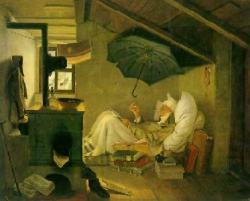
"A man of letters and not merely a singer/songwriter", the "poet of rock and roll" and "ascetic prophet of acoustic disaffectedness", or simply "poet of gloom and despair", he had been called by the press.
![]() Happy Birthday Kinky Friedman!
Happy Birthday Kinky Friedman!
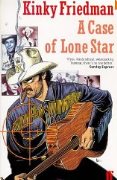 Richard Samet Friedman
[28]
had been born on 1st November 1944 in Chicago to Jewish parents, nickname "Kinky" because of his curly hair.
The family moved to a ranch in central Texas a few years later. In the early 1970s, he had formed Kinky Friedman and The Texas Jewboys,
finding cult fame as a country and western singer. His repertoire mixed social commentary ("We Reserve
the Right to Refuse Service to You") and maudlin ballads ("Western Union Wire") with raucous humor ("Get Your Biscuits in the Oven and Your Buns in Bed").
Kinky's "Ride 'Em Jewboy" was an ex- tended tribute to the victims of the Holocaust.
One of his most famous songs is "They Ain't Makin' Jews Like Jesus Anymore," in which he
beats up a drunken white racist: "Oh, they ain't makin' Jews like Jesus anymore, they ain't makin' carpenters that know what nails are for..."
Kinky Friedman was one of two independent candidates in the 2006 election for the office of Governor of Texas.
Receiving 13% of the vote, he placed fourth in the six-person race.
Kinky supports higher pay for teachers, alternative fuel resources such as wind and
biodiesel, and the full legalization of hemp and marijuana.
Richard Samet Friedman
[28]
had been born on 1st November 1944 in Chicago to Jewish parents, nickname "Kinky" because of his curly hair.
The family moved to a ranch in central Texas a few years later. In the early 1970s, he had formed Kinky Friedman and The Texas Jewboys,
finding cult fame as a country and western singer. His repertoire mixed social commentary ("We Reserve
the Right to Refuse Service to You") and maudlin ballads ("Western Union Wire") with raucous humor ("Get Your Biscuits in the Oven and Your Buns in Bed").
Kinky's "Ride 'Em Jewboy" was an ex- tended tribute to the victims of the Holocaust.
One of his most famous songs is "They Ain't Makin' Jews Like Jesus Anymore," in which he
beats up a drunken white racist: "Oh, they ain't makin' Jews like Jesus anymore, they ain't makin' carpenters that know what nails are for..."
Kinky Friedman was one of two independent candidates in the 2006 election for the office of Governor of Texas.
Receiving 13% of the vote, he placed fourth in the six-person race.
Kinky supports higher pay for teachers, alternative fuel resources such as wind and
biodiesel, and the full legalization of hemp and marijuana.
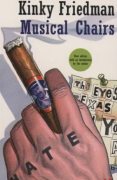 When his music career stalled in the 1980s, Friedman had begun to write detective novels.
His books feature a fictionalized version of himself, a retired country musician turned private eye,
solving crimes while enjoying plenty of cigars, espresso and whiskey and dispensing jokes and wisdom.
When his music career stalled in the 1980s, Friedman had begun to write detective novels.
His books feature a fictionalized version of himself, a retired country musician turned private eye,
solving crimes while enjoying plenty of cigars, espresso and whiskey and dispensing jokes and wisdom.
The second mystery, A Case Of Lone Star (1987), takes place in the legendary Lone Star Cafe
on the edge of Greenwich Village, the East Coast mecca for country & western fans.
After three well-known country stars have been killed, the management experiences some difficulty in booking new acts.
Asked to step in, Kinky focuses on a letter containing Hank Williams lyrics, which each victim had received.
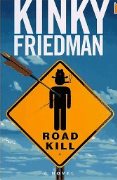 Who would want to kill the former Texas Jewboys? Ap- parently, any number of people. And that's what Kinky
has to figure out in Musical Chairs (1991). To protect his ex-band members, three of whom have died mysteriously,
Kinky brings the survivors of the group, which broke up 13 years ago, to New York City for a reunion tour in order to trap the murderer.
Who would want to kill the former Texas Jewboys? Ap- parently, any number of people. And that's what Kinky
has to figure out in Musical Chairs (1991). To protect his ex-band members, three of whom have died mysteriously,
Kinky brings the survivors of the group, which broke up 13 years ago, to New York City for a reunion tour in order to trap the murderer.
Kinky joins the legendary singer Willie Nelson [51] and his extensive entourage aboard his tour bus,
trying to cheer him up and find out just what it is that's bothering his old pal.
It turns out that Willie's bus had encountered an intoxicated Indian; the result is Roadkill (1997) and an apparently unshakable Indian curse.
Then someone shoots one of Nelson's crew, mistaking him for the singer, and Willie is indeed in danger.
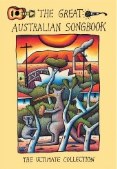 Australian music journalist Toby Creswell says:
"Australian songs are very much like average Australians - we don't go for the overly
sentimental or the un- necessarily ornate, as so many British and American writers do.
We like a bit of irony, some self-deprecating humour. Most of all, we love straight talking, emotional honesty."
The Great Australian Songbook, now in its 4th edition,
spans over seven decades of the nation’s musi- cianship and over 300 songs from "A Pub With No Beer" to "Yorta Yorta Man".
Arranged with melody line, lyrics and chords, folk songs such as "Shores of Botany Bay",
"Wild Colonial Boy" [31]
and Banjo Patterson's "Waltzing Matilda" trace the history of the nascent nation.
Aboriginal singer-songwriters such as Yunupingu [52]
have become an important voice for indigenous Australians.
Furthermore, there are singer-songwriters such as Eric Bogle [51] (author of the anti-war song "And The Band Played Waltzing Matilda")
and Angus and Julia Stone [42], pop and rock songs from AC/DC and the Bee Gees to Nick Cave and Kasey Chambers [46],
chart hits such as "Friday On My Mind", "Love is in the Air", "You're the Voice", ...
Australian music journalist Toby Creswell says:
"Australian songs are very much like average Australians - we don't go for the overly
sentimental or the un- necessarily ornate, as so many British and American writers do.
We like a bit of irony, some self-deprecating humour. Most of all, we love straight talking, emotional honesty."
The Great Australian Songbook, now in its 4th edition,
spans over seven decades of the nation’s musi- cianship and over 300 songs from "A Pub With No Beer" to "Yorta Yorta Man".
Arranged with melody line, lyrics and chords, folk songs such as "Shores of Botany Bay",
"Wild Colonial Boy" [31]
and Banjo Patterson's "Waltzing Matilda" trace the history of the nascent nation.
Aboriginal singer-songwriters such as Yunupingu [52]
have become an important voice for indigenous Australians.
Furthermore, there are singer-songwriters such as Eric Bogle [51] (author of the anti-war song "And The Band Played Waltzing Matilda")
and Angus and Julia Stone [42], pop and rock songs from AC/DC and the Bee Gees to Nick Cave and Kasey Chambers [46],
chart hits such as "Friday On My Mind", "Love is in the Air", "You're the Voice", ...
Toby Creswell (ed), The Great Australian Songbook - The Ultimate Collection.
Music Sales,
2013, ISBN 978-0- 949785-30-5, pp544, €57.70
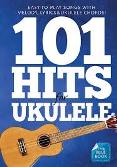 Its recent resurgence in popularity has meant that more and more songbooks are especially published for the
small guitar-like instrument from Hawaii called
ukulele. [45][49][50][54]
101 Hits for Ukulele is a mixed collection of easy and intermediate pop, soul, folk and country songs from every era, the best all-time hits old and new:
"Ain't No Sunshine" to "Ziggy Stardust", Adele to The Zombies.
Each song features lyrics, uku chords and melody line to make you strumming along as quickly as possible.
Its recent resurgence in popularity has meant that more and more songbooks are especially published for the
small guitar-like instrument from Hawaii called
ukulele. [45][49][50][54]
101 Hits for Ukulele is a mixed collection of easy and intermediate pop, soul, folk and country songs from every era, the best all-time hits old and new:
"Ain't No Sunshine" to "Ziggy Stardust", Adele to The Zombies.
Each song features lyrics, uku chords and melody line to make you strumming along as quickly as possible.
101 Hits for Ukulele.
Wise Publications,
2014, ISBN 978-1-78305-868-6, pp191, UK£14.95
Leonard Cohen had published poetry and novels which gained critical recognition but sold few copies. Disappointed with his lack of financial success as a writer and after his song "Suzanne" became a big hit for Judy Collins,[54] he pursued a career as a singer/songwriter that is lasting to this very day.

During those 50 years, many words, lines and pages have been written about the man and his music. However, noone talks about Cohen like Cohen himself. In four parts, Leonard Cohen on Leonard Cohen is exploring an illustrious career.
In the SIXTIES & SEVENTIES, Leonard Cohen is drawing attention with his poetry and fiction, then starting out as singer/songwriter. His debut album in 1967 becomes a cult favorite.
Cohen himself, who has been satirized as being suicidal, melancholy, and self-indulgent, is guessing:
Cohen became the perfect soundtrack to go along with a couple of candles and a bottle of wine. During the EIGHTIES, he somehow rested on his laurels, but also put out works such as the popular song "Halleluja", which has been covered by almost 200 artists to date.
In the NINETIES, Cohen, who had been born into a middle-class Jewish family, retreated to the Mount Baldy Zen Center near Los Angeles to try out the life of a Buddhist monk. His albums then re-established him as the most literate songwriter in popular music.
In the NEW MILLENNIUM things started out anew. Cohen has the most successful tours and album sales of his whole career. Once again, Cohen muses why he has written so many sad songs:
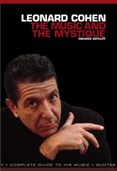
His own words are taken from over 50 interviews conducted worldwide between 1966 and 2012, that first appeared in newspapers and magazines, on radio and TV. Some are more expanded, transcribed from the raw footage, providing details about the background and the interviewer.
This is not the usual Q&A with pop and rock stars. Cohen is charm personified and talks thoughtfully about his ups and downs and his main themes and concerns - love, sex, religion, personal chaos, depression and suicide.
Furthermore, "Cohen Clips" are short snippets from Cohen, thoughts about things such as women, revolution and depression, pop music, his voice and songwriting, his musical forebears and his early influences, the sources of his songs as well as cover versions of his songs, and much much more.
The volume might not pass as an introduction to Cohen’s work, but a rich source for the Leonard Cohen aficionado. The course of these nearly 600 pages is following major events in Cohen’s life, both personally and artistically. You may find much unexpected and those fascinating little details that you're not likely to read in other interviews.

Writer/photographer Pat Harbron did ask Cohen in 1973: How can you best classify your music? Some would have it as folk music. Leonard Cohen has answered:
In September 2014, Leonard Cohen was celebrating his 80th birthday by releasing a new album. He hasn't stopped touring ever since after his 2008 onstage comeback, musing:
Or in the words of his "Tower of Song": You'll be hearing from me baby, long after I'm gone ...

The short story collection Chinese Transvestites and Other Irish Stories has been inspired by Mick Fitzgerald's[48] other successful compendium "Session".[44] The idea had been to find further Irish musicians who are also writers (in the broadest sense) or to find further stories relating to Irish music.
Here are 14 items. In the cover story, Mick Fitzgerald, himself an occasional actor, puts a film crew into O'Donoghues Pub in Dublin.[9] Karin Braun introduces the punk band Puking Goblins that not only do violence to the classic Irish folk song "Molly Malone", but also bring down a corrupt mayor. Evelyn Conlon is trying to figure out the title of a dance tune:
"I'm telling you it's Gannon's Barndance." "No, it's not, it's one of Ed Reavey's, The Dances at Kinvara?" "Don't think so, I think it's Fred Finn's, that funny polka." "Or it could be Kafoozoum?" "Tell you what, get Breathnach down." "No it wouldn't be there but if you can find that record of Andy's I think it was on it." "Never, he never played that one." "He did so, not that same version but the one that goes ..."
"The Harpist of Hardenstein", an enchanted leprechaun named Goldemar, teaches the young girl Kamaria unintentionally that the secret lies not in the instrument that one plays (a musician is always only as good as his instrument, says Goldemar), but the most valuable instrument is not always the most beautifully decorated. The tale is a sequel of Ulrich Joosten's[41] medieaval novel for young people "Der Weg des Spielmanns" (The Way of the Minstrel).[54] Question: Why are the horses called Hein and Oss? No, it's not after Duke Henry the Lion and the Gaelic bard Ossian![37]
Kerstin Flenter mixes fact and fiction. The story's title "We're all gone, gone in the years, babe" comes from The Pogues' singer Shane MacGowan's song "Broad Majestic Shannon".[22] More akin to fact than fiction are Pádraig Pearse (who was executed in 1916 after the Dublin Easter Rising) and journalist Ralf Sotscheck. Singer-songwriter Andy Irvine[55] describes a typical after-show party: We had a meal and a few drinks and a few more drinks and eventually we went on to another place.
Gabriele Haefs recalls Pádraig Ó Carra, zither player and Niamh Ní Charra's uncle,[51] who played with Maire Ní Chathasaigh and Mairtin O'Connor at the second Irish Folk Festival tour in 1975. Petr Pandula, manager of the Magnetic Music agency and the Irish Folk Festival[54] these days, was in the audience in the following year:
Pandula hitchhiked to Ireland and learned tin whistle tunes from Micho Russell himself in the western Irish village of Doolin.[40] The rest is history - in the truest sense of the word.
|
|
|
|
Photo Credits:
(1ff) Book Covers,
(9) Mick Fitzgerald,
(11) Ulrich Joosten (Gambrinus),
(12) Micho Russell
(from website/author/publishers);
(10) Andy Irvine (by Walkin' Tom).